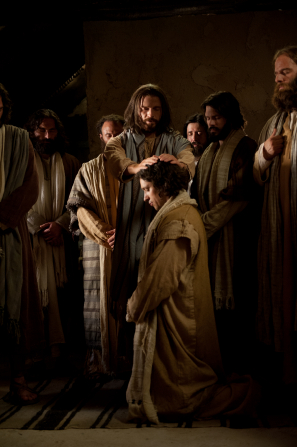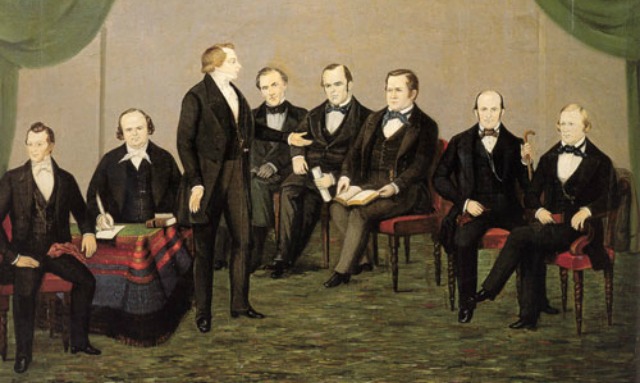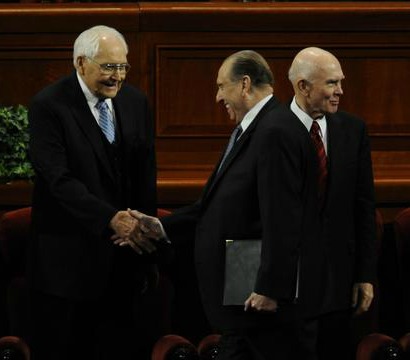Throughout the history of the world, God has called prophets to teach His people. During the Savior’s mortal ministry, He called twelve Apostles to be special witnesses of Him who would preach the gospel and lead His Church. When the gospel of Jesus Christ was restored to the earth through the Prophet Joseph Smith, the Lord again established prophets and Apostles to lead His modern organization—The Church of Jesus Christ of Latter-day Saints. As President Russell M. Nelson explained:
The living Lord leads His living Church! The Lord reveals His will for the Church to His prophet. …
The Church today has been organized by the Lord Himself. He has put in place a remarkable system of governance that provides redundancy and backup. That system provides for prophetic leadership even when the inevitable illnesses and incapacities may come with advancing age. Counterbalances and safeguards abound so that no one can ever lead the Church astray.
The organization of the modern Church of Jesus Christ is patterned after His ancient Church. The divinely inspired structure provides a solid foundation for the functioning of the Church.
Organization of Christ’s Church
When Jesus Christ was on the earth, He organized His Church through the power of the priesthood. Elder M. Russell Ballard explained:
When Jesus called His twelve Apostles, He laid His hands upon them, ordained them, and conferred upon them the authority to act in His name and govern His church.
The Apostles were given the keys of the priesthood. Peter was the first Apostle called. Thus, Elder L. Tom Perry said:
Peter became the one responsible for holding all the keys on earth in leading the Church after the departure of the Savior.
The Twelve Apostles were special witnesses of Jesus Christ, testifying of Him and teaching the people. Elder Perry said:
Obeying the Savior’s injunction (see Mark 16:15), the Apostles preached the gospel and organized branches of the Church. In many cases, they had the opportunity of visiting branches only once, which gave them little opportunity to teach and train.
This caused problems for the early Saints. Elder Ballard said:
Early Christians endured the challenges of persecution and hardship. Peter and his brethren had a difficult time holding the Church together and keeping the doctrine pure. They traveled extensively and wrote to one another about the problems they were facing, but information moved so slowly and the Church and its teachings were so new that heading off false teachings before they became firmly entrenched was difficult.
The persecution and problems persisted, and the ancient Church did not survive in its purity. Elder Ballard explained:
Eventually, with the known exception of John the Beloved, Peter and his fellow Apostles were martyred. The Apostle John and members of the Church struggled for survival in the face of horrifying oppression. To their everlasting credit, Christianity did survive and was truly a prominent force by the end of the second century A.D. Many valiant Saints were instrumental in helping Christianity to endure.
Despite the significance of the ministries of these Saints, they did not hold the same apostolic authority Peter and the other Apostles had received through ordination under the hands of the Lord Jesus Christ Himself. When that authority was lost, men began looking to other sources for doctrinal understanding. As a result, many plain and precious truths were lost.
Although Christianity survived, the priesthood power and apostolic keys were lost from the earth.
Priesthood Keys and Organization
The priesthood power and keys were lost to the earth following the martyrdom of the ancient Apostles, and restored to the earth to the Prophet Joseph Smith. President James E. Faust said:
Peter, James, and John conferred the keys of the kingdom of God upon the Prophet Joseph and ordained him to be an Apostle and a special witness of the name of the Savior and to bear the keys of his ministry. Keys that pertain to the gathering of Israel, the dispensation of Abraham, and, indispensably, the keys of sealing were conferred upon the Prophet by Moses, Elias, and Elijah in 1836.
The Lord was once again prepared to establish His Church on the earth. But this process would take time. President Boyd K. Packer explained:
Some suppose that the organization was handed to the Prophet Joseph Smith like a set of plans and specifications for a building, with all of the details known at the beginning. But it did not come that way. Rather, it came a piece at a time as the Brethren were ready and as they inquired of God.
Less than a year later, The Church of Jesus Christ was organized. Mormon scholars Brent L. Top and Lawrence R. Flake explained:
At the organization of the Church on 6 April 1830 there were no priesthood quorums or First Presidency. Joseph Smith and Oliver Cowdery were designated by the Lord and sustained by the Church as Apostles of Jesus Christ and as “first elder” and “second elder,” respectively (see Doctrine & Covenants 20:2–3). …
Oliver was … the “Assistant President” of the Church and the co-holder of all priesthood keys with Joseph. Even after counselors were called to assist the Prophet Joseph in March 1832 (see Doctrine & Covenants 81) and after the formal organization of the First Presidency in March 1833, Oliver continued in his office as “assistant-president to the High and Holy Priesthood” until his excommunication from the Church in 1838.
Then came the Quorum of the Twelve Apostles. Mormon scholar William G. Hartley wrote:
In 1835 the Quorum of the Twelve Apostles and the quorum of the seventy were organized. The Twelve, subordinate to the First Presidency, were assigned by revelation to preside outside organized stakes as a traveling high council. This included ordaining and supervising other officers of the Church outside stakes, including Patriarchs. They were also to direct proselytizing in all lands, assisted by the seventy. The Seventy’s presidency of seven, called the first council of the seventy, were sustained with other General Authorities in August 1835.
The Role of the Twelve Apostles
The role of the Quorum of the Twelve was established line upon line. Professors Top and Flake wrote:
In those early years the Quorum of the Twelve Apostles did not play as prominent a role in Church administration as it does now, nor did the Prophet Joseph rely on the quorum as heavily for counsel as he did other priesthood leaders. … But in January 1836 Joseph clarified the authority of the Twelve when he declared that they stood next to the First Presidency in authority “and are not subject to any other than the first presidency.”
The role of the Twelve Apostles continued to expand through the difficult periods of the early Church of Jesus Christ. In addition, their experiences in setting up congregations throughout the United States and Europe helped to prepare them for their increased responsibilities. Professors Top and Flake continued:
Their return to Nauvoo in the summer of 1841 came at an important time when the Prophet Joseph especially needed their counsel and assistance in governing the Church. At a time of apostasy and renewed persecution, the Prophet gratefully reported that he now had a quorum upon which he could depend. It was at this time that the Twelve began to receive private instruction and increased authority from the Prophet that not only eased his burdens and blessed the Church but also paved the way for an eventual successor. At a special conference of the Church in 1841, Joseph said that the time had come for the Twelve to “assist to bear off the kingdom victorious to the nations.” Furthermore, the time had come “when the twelve should be called upon to stand in their place next to the first presidency” to administer the affairs of the Church on a general level.
The time had come for the Lord to implement His system of safeguards for the priesthood keys of the kingdom of God. President Faust explained:
Prior to the martyrdom, no doubt with a sense of foreboding, the Prophet Joseph prepared for his death. President Joseph Fielding Smith states:
“The Prophet declared that he knew not why, but the Lord commanded him to endow the Twelve with these keys and priesthood, and after it was done, he rejoiced very much, saying in substance, ‘Now, if they kill me, you have all the keys and all the ordinances and you can confer them upon others, and the powers of Satan will not be able to tear down the kingdom as fast as you will be able to build it up, and upon your shoulders will the responsibility of leading this people rest.’”
The Twelve Apostles and the First Presidency (the prophet and his two counselors) have all of the priesthood keys of the kingdom of God. Of the structure of The Church of Jesus Christ, President Gordon B. Hinckley explained:
When a man is ordained to the apostleship and set apart as a member of the Council of the Twelve, he is given the keys of the priesthood of God. Each of the fifteen living men so ordained holds these keys. However, only the President of the Church has the right to exercise them in their fulness. He may delegate the exercise of various of them to one or more of his Brethren. Each has the keys but is authorized to use them only to the degree granted him by the prophet of the Lord.
Thus, the Twelve Apostles have all of the priesthood keys, but they only use them as directed by the prophet.
What Happens When the Prophet Dies?
When the Prophet Joseph Smith died, there was some uncertainty among the Latter-day Saints as to what would happen next. However, the prophet had taught the apostles about what their role would be. Elder David B. Haight said:
In 1835 the Lord gave a revelation on this matter that provides for orderly succession. The revelation states that the Quorum of the Twelve Apostles is a body equal in authority to the First Presidency. (See Doctrine & Covenants 107:24.) That means that when the President of the Church dies, the First Presidency is dissolved and the Quorum of the Twelve automatically becomes the presiding body of the Church. That pattern was established with the death of the Church’s first President, Joseph Smith.
Following the martyrdom of the Prophet Joseph and his brother Hyrum in 1844, the Quorum of the Twelve, with Brigham Young as quorum president, presided over the Church for the next 3 1/2 years.
But the young Church needed a new prophet, and the Lord set the pattern through the Twelve Apostles. Elder Haight continued:
Then, on the banks of the Missouri River in Winter Quarters on December 5, 1847, the Quorum of the Twelve Apostles met in council at the home of Orson Hyde. Each of the twelve Apostles expressed his views regarding the matter of reorganizing the First Presidency. … On that occasion, Brigham Young, President of the Quorum of the Twelve Apostles, was unanimously sustained by members of that body as President of the Church. He selected Heber C. Kimball and Willard Richards as counselors. This action created a new First Presidency, which was later sustained by the unanimous vote of the Saints at a general conference of the Church held December 24, 1847, in a log tabernacle constructed at Winter Quarters by the Saints for this special conference. This action was later ratified by members of the Church at conferences in Iowa, Salt Lake City, and the British Isles.
This divinely revealed procedure for installing a new First Presidency of the Church—revelation from the Lord and sustaining by the people—has been followed to our present day.
The smooth transition of leadership in The Church of Jesus Christ did not occur all at once. President Packer explained:
It took a generation of asking and receiving before the order of things as we know it today was firmly in place. Each move to perfect that order has come about in response to a need and in answer to prayer. And that process continues in our day.
This is especially true with the Quorum of the Twelve Apostles in determining the senior member. Initially, Joseph Smith instructed the Quorum of the Twelve to organize themselves in order of their birthdays. Thus, the senior member was the oldest. This, however, did not last. Mormon historian B.H. Roberts noted:
It should be observed here that this arrangement has reference only to the first organization of the quorum of the Twelve. After this arrangement, the brethren of that quorum held and now hold their place in it and preside according to seniority of ordination, not of age. [History of the Church, 2:219-220, Deseret Book Company]
At the death of a prophet, the senior apostle becomes the next president of The Church of Jesus Christ. This seniority is based on the date an apostle is ordained. In the event that more than one apostle is called on the same day, the order is determined by who was called first, second and so forth.
How is an Apostle Called?
In the Quorum of the Twelve Apostles, members serve for the remainder of their lives or until they are removed for unrighteousness. The process of calling an apostle was also established in the early days of The Church of Jesus Christ. Elder D. Todd Christofferson explained:
[President Monson’s] practice has been to ask each of his counselors and the members of the Quorum of the Twelve to give him names they would recommend for his consideration, not to discuss with each other but just individually, to give him whatever name or names they feel impressed he ought to look at. …
What process he goes through exactly, I’m not sure. That’s, again, something private he pursues. He then brings back, when he’s reached his decision and had the inspiration he needs, the name or names to the council that we have of the First Presidency and the Quorum of the Twelve Apostles to sustain it. That goes forward to general conference.
According to The Church of Jesus Christ:
The new member of the Twelve may be called from one of the Quorums of the Seventy (which are made up of General Authorities who are senior leaders in the Church) or from general Church membership around the world.
As in the days of the Savior, Apostles were called from various walks of life. But, as President Packer said,
… While we are men called from the ordinary pursuits of life, there rests upon us a sacred ministry. And we take comfort in what the Lord said to the original Twelve: “Ye have not chosen me, but I have chosen you, and ordained you.”
Through the structure and organization of The Church of Jesus Christ, the work of the Lord moves forward.




